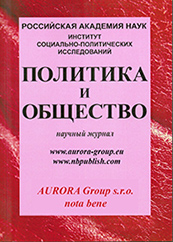ИСТОРИЯ ПРАВА
Правильная ссылка на статью:
Георгиевский Э.В. К вопросу об общественно-политических и культурно-религиозных основаниях древнегерманского уголовно-правового генезиса // Политика и Общество. 2014. № 5. С. 541-553. URL: https://nbpublish.com/library_read_article.php?id=54229
Аннотация:
Предметом исследования является исторический процесс уголовно-правового генезиса у древнегерманских племен, в период, предшествовавший образованию первых варварских королевств эпохи меровингов. Основаниями такого правогенеза является совокупность общественно-политических и культурно-религиозных признаков, отражающих полукочевой образ жизни и быта древних германцев, их воинственность, любовь к свободе, и праву силы. Особенности устройства общинной организации и мифо-поэтического отражения окружающего мира, соединенные в одно целое, привели к формированию совершенно особого правового восприятия древних германцев времен Цезаря и Тацита галло-римским окружением. В работе используется конкретно-исторический метод исследования, опирающийся на анализ и научную интерпретацию историко-правового материала. Появление на исторической сцене древних германских племен связано с процессом их переселения, движения, смены «ареала» существования, а значит, неизбежно с военными столкновениями с коренным населением захватываемых земель. Отсюда рождение права силы, формирующего особый образ человека-воина, прошедшего процедуру инициации, свободного юридического субъекта. Пленный враг, чужой, а значит не только враг, но и преступник, достойный самого сурового наказания, за то, что оказал сопротивление. Право силы, право войны санкционируется верховными антропоморфными божествами, а значит близкими и понятными, достойными подражания или порицания. Враг-герой иногда достоин уважения. Свобода юридического субъекта выражается в возможности всеобъемлющего участия в жизни общества, в решении вопросов войны и мира, правосудия. И хотя правовая сторона жизни общества не выделяется в особую сферу, она инвариантна, и, вместе с тем, проста и понятна каждому. Правовой обычай в основном сформирован социально-политическим устройством древнегерманского общества, но также неразрывно связан с религией, которая также подвержена видовой трансформации. Во многом, характер правогенеза у древних германцев носил уголовно-правовой оттенок, так как неразрывно был связан с решением именно тех важнейших вопросов (жизни, смерти, чести, родового кровомщения), которые изначально во всем мире относились именно к данной сфере правового регулирования.
Ключевые слова:
правогенез, Древняя Германия, война, пленный, жертва, галлы, религия, мифология, оппозиция, христианство
Abstract:
The subject under review is the historical process of the genesis of criminal law in Ancient German tribes prior to
the formation of the fi rst Barbarian kingdoms of the Merovingian epoch. The grounds for that genesis of law were the combination
of socio-political and cultural-religious features of the seminomadic style of life and everyday life of Ancient Germans,
their hostility, love for freedom and ‘the rule of force’. Peculiarities of community-based organizations and poetical mythopoetic
refl ection of the surrounding world, combined as one whole, led to the formation of a completely different legal perception
of Germans of the times of Caesar and Tacitus. The researcher uses the particular historical research method which
is based on the analysis and scientifi c interpretation of historical and legal materials. Appearance of Ancient German tribes
on the historical scene was caused by their migration and change of the territory which, in its turn, inevitably led to military
collusions with the native population of conquered lands. This is where the rule of force comes from. The rule of force creates
a special image of a warrior who underwent the initiation procedure and became a free legal entity. A captured enemy
is an alien and not only an enemy but also a criminal who deserves the most severe punishment for showing resistance. The
'rule of force' and the 'right of war' are sanctioned by the supreme anthropomorphic gods who are close and understandable
and therefore worthy of respect or blame. However, a heroic enemy sometimes can be worthy of respect too. The freedom of a legal entity is expressed in his right to fully participate in public life and decision making process regarding war
and peace and justice. Even though the legal side of public life was not viewed as an individual sphere, it was invariant and
at the same time simple and easy to understand for everyone. Legal customs were mostly formed by the social and political
structure of the Ancient German society and at the same time they were inextricably entwined with religion which was susceptible
to transformation, too. In many ways, the nature of the law genesis of Ancient Germans had a criminal law aspect
because it was inseparably related to the solution of the most important issues (death, life, honor and blood feud) which had
been initially referred to that sphere of legal regulation all over the world.
Keywords:
law genesis, Ancient Germany, war, captive (prisoner), victim, Gauls, religion, mythology, opposition, Christianity.
 Статья опубликована с лицензией Creative Commons Attribution-NonCommercial 4.0 International License (CC BY-NC 4.0) – Лицензия «С указанием авторства – Некоммерческая».
Статья опубликована с лицензией Creative Commons Attribution-NonCommercial 4.0 International License (CC BY-NC 4.0) – Лицензия «С указанием авторства – Некоммерческая». Рус
Рус













 © 1998 – 2025 Nota Bene. Publishing Technologies. NB-Media Ltd.
© 1998 – 2025 Nota Bene. Publishing Technologies. NB-Media Ltd.




